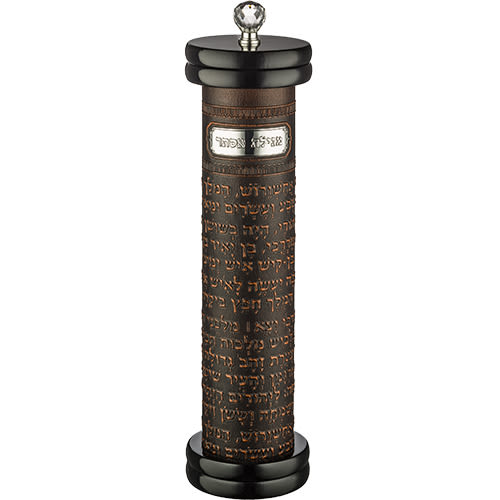
Behar: Above Nature’s Limitations
A Jewish farmer in the Holy Land is commanded to give the land a rest during the Sabbatical Year. In turn, HaShem promises...

"And I shall command My blessing for you in the sixth year and it will yield a crop sufficient for the three-year period" (Vayikra 25:21).
A Jewish farmer in the Holy Land is commanded to give the land a rest during the Sabbatical Year. In turn, HaShem promises a triple yield for the sixth year crop – enough grain for the latter part of the sixth year, for the Sabbatical Year when planting and working the soil is forbidden, for the eighth year while the new grain is growing, and for the first part of the ninth year until the Omer-offering on the 16th of Nissan when the new grain is permitted.
Why does HaShem use such stern language when He promises, "I shall command My blessing"? Wouldn't it appear more logical for HaShem to say something more delicate, such as "I shall bestow my blessing"?
The explanation to the above questions is surprisingly simple: Nature and the natural functioning of the creations are instilled within every creation. Yet, nature is nothing but a tool in HaShem's hands and the normal mode that HaShem uses to run the world. HaShem can override nature wherever and whenever He desires by issuing a special command. As a general rule, the Land gives a normal yield, plus/minus thirty percent. But a guaranteed triple yield at the exact time of the post-Sabbatical Year requires that HaShem issue a special command. Therefore, HaShem says that He'll command His blessing; in other words, HaShem performs a special miracle for those faithful farmers who fear His Holy Name.
Rebbe Nachman of Breslev teaches that both prayer and trust in HaShem elevate a person above the limitations of nature, especially in the Land of Israel. Prayer, explains Rebbe Nachman (see Likutei Moharan I:7), is the expression of emuna, or complete faith that HaShem renews the world each day as He wishes. Therefore, by prayer, one can affect miracles above the level of nature. Israel is the Land of emuna and prayer, and conducive to miracles. Elsewhere (Ibid. 66), Rebbe Nachman remarks that by trusting HaShem, in other words, by looking to HaShem for all our needs, we receive abundance and sustenance at exactly the right time, a concept that also defies nature. Practically, this means that even though pay day is a week away, through prayer and trust in HaShem, a person can receive whatever he or she needs right now!
Let's look at an eye-opening detail in this week's Torah portion: HaShem says, "I shall command my blessing" (Vayikra 25:21) only after the Torah chastises the skeptical farmer that lacks trust in HaShem and asks, "What will we eat in the seventh year?" (Ibid. 20). If the farmer would have listened to Rebbe Nachman's advice and prayed to HaShem and trusted in HaShem, then HaShem wouldn't have had to override nature and command the blessing of a triple yield. The farmer's prayers and trust in HaShem alone would have been sufficient to invoke the miracle of a triple yield! All he has to do is ask his beloved Father in Heaven, and to place his trust in Him!
With HaShem's guidance, the following parable will make the concepts of prayer and trust easy to understand:
A great King reigned over one hundred twenty-seven countries. His wealth was unfathomable. If all the trees in the forests were pens and all the water in the rivers were ink, they would be unable to list all the King's riches. Yet the King had a full measure of sorrow in life; his beloved only son had disappeared from the palace, and no one knew where he was.
One day, the King sent one of his ministers on a special mission to a faraway land. After a meeting with the local dignitaries, the minister took a stroll through one of the foreign city's picturesque parks. He saw a familiar-looking figure lying on a bench. "Where on earth have I seen that beggar before?" the minister asked himself. He stepped closer for a better look and a young man in tattered clothes, torn shoes, and matted blond hair that hadn't seen a bar of soap in weeks looked up at him sheepishly. "Y-you're the prince!" exclaimed the minister. "You can't fool me – I recognize you, grit, grime, and all! What are you doing here?"
Embarrassed, the prince answered, "I came here in search of a livelihood – a means of sustenance. I haven't had much success. As a matter of fact, I'm flat broke!"
"Are you daft?" thundered the minister. "Your father the King is the richest man on earth! He's been looking for you everywhere – he misses you so much. He can give you anything and everything you need, with a single command…"
The skeptic, pea-brained prince interjected, "…but how do I know that my father will give me whatever I need? He's the King and he runs the entire kingdom; how do I know he cares about me?"
"Dimwit!" yelled the minister, "you're his only son! He loves you more than anyone else! Have you ever asked him for what you need?"
"No," answered the prince, "I never had the time…"
* * *
As ludicrous as the above parable may seem, it describes many of us perfectly. Rather than asking our beloved Father in Heaven for all of our needs, we exert needless energy running all over the place trying to scrape together a living.
HaShem is more than happy to provide whatever we need exactly when we need it. But, HaShem wants us to learn – for the ultimate good of our souls – prayer, faith, and trust. The triple-pronged spiritual power of prayer, faith, and trust is capable of invoking tremendous abundance, to the extent that HaShem sends the trusting person's sustenance right to his or her doorstep, enabling him or her to concentrate on Torah learning and doing mitzvot. Throughout history until this very day many farmers in the Land of Israel take advantage of the Sabbatical Year to sit in the House of Study. This demonstrates that HaShem overrides the laws and limitations of nature to feed and sustain his beloved children. By virtue of prayer and trust, may we all merit an abundance of spiritual and material blessings always, Amen.











Tell us what you think!
Thank you for your comment!
It will be published after approval by the Editor.